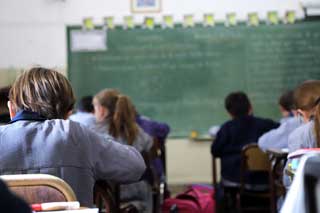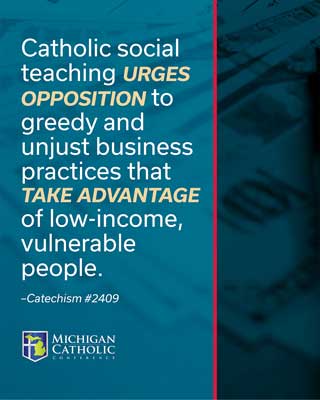Lansing Update: Lawmakers Propose Restoring Some Planned Cuts to Nonpublic Schools
Posted April 19, 2024
Senate Restores Some Funds to Nonpublic Schools Following 4,000+ Grassroots Messages to Lawmakers
Two crucial sources of state funds for nonpublic schools were restored in a proposed budget advanced by a Senate committee this week, as grassroots messages sent to lawmakers urging support for nonpublic schools topped more than 4,000 in a week.

The Senate K–12 Appropriations Subcommittee unveiled and then approved a proposed school spending plan for the fiscal year that begins October 1. The budget restored $600,000 in grants for nonpublic school students to participate in robotics competitions, as well as $1 million for nonpublic schools to pay for the cost of complying with state-implemented health and safety mandates.
Despite grassroots advocates sending more than 4,000 messages to lawmakers over the past week urging restoration of $18 million in school safety and mental health funding, the Senate school budget did not include that funding at this time.
Michigan Catholic Conference (MCC) issued the Action Alert to members of the Catholic Advocacy Network (CAN) like you, and the Michigan Association of Nonpublic Schools (MANS) distributed the Action Alert to its member schools across the state, which include Catholic and other nonpublic schools. If you haven’t yet, take a few seconds to click or tap to send a message to your lawmaker now to remind them to include nonpublic schools in safety and mental health funding.
In addition to the safety funding, MCC and MANS will continue to advocate on behalf of nonpublic schools to encourage lawmakers to include them in state funding in several other crucial areas, such as for expanding school meal access to all children and for the training and recruiting of teachers. The Governor’s budget proposal released earlier this year cut or left nonpublic schools out of these funding streams.
In some cases, such as the school safety funding, nonpublic schools had been receiving funds on an annual basis going back to 2015.
The Senate school spending budget now sits in the Senate Appropriations Committee for further consideration. The House is expected to unveil its own school spending document next week.
MCC-Supported Effort to End Predatory Lending Practices on the Poor Continues in House
MCC this week continued its advocacy on behalf of vulnerable, low-income people who get trapped in predatory payday lending debt before a House committee that is considering legislation to cap interest rates on payday loans.
The House Insurance and Financial Services Committee took testimony on Senate Bill 632, sponsored by Sen. Sarah Anthony (D-Lansing), which would limit the annual interest rate tied to payday loans at 36%, considering the current interest rates can climb as high as 400% and have been attributed to causing cash-strapped individuals to fall into debt.
In testimony before lawmakers, Tom Hickson, vice president for public policy and advocacy for MCC, shared that MCC’s advocacy is focused on protecting “the most vulnerable members of society,” and noted that “we now have over 20 years of data that demonstrates the devastating cycle of debt these types of loans trap people in.”
Hickson told committee members that 70% of payday loan borrowers take out a new loan the day they pay off another loan and that nearly 75% of the revenue earned by payday lenders comes from borrowers who take out 10 or more loans per year.
“The system is designed for repeat borrowers,” Hickson said.
MCC, along with other supporters of the legislation to cap payday lending rates, repeatedly pointed out to lawmakers that other low-interest, small-dollar loan options exist for people who need access to cash. These are available from banks, credit unions, and charitable organizations like the St. Vincent de Paul Society. MCC also reminded lawmakers that Catholic-affiliated organizations like St. Vincent de Paul offer services and support to all people, not just members of the Catholic faith.
The committee took testimony only on the legislation, which also included the House version of the legislation, House Bill 5290, sponsored by Rep. Abraham Aiyash (D-Hamtramck). Senate Bill 632 has already cleared the full Senate with bipartisan support.
As a member of the Catholic Advocacy Network, we are encouraging you to reach out to your state representative to urge passage of this bill in the House. Click or tap here to send a message now.
To read more about MCC’s advocacy around payday lending and its connection to protecting the vulnerable and marginalized, click or tap to read this column published on the issue in Detroit Catholic.
Nonpublic Schools Added Back Into Bills to Improve Responses to Heart Attacks in Schools
MCC persuaded lawmakers to continue including nonpublic schools in legislation aimed at helping school staff prepare to respond quickly to heart attacks that occur on school grounds.
Under House Bills 5527 and 5528, nonpublic schools would continue to be required to develop cardiac emergency plans to help address those situations. Those plans would include how to use and maintain automated external defibrillators (AEDs) as well as training staff on how to respond to heart attacks and how to use the AEDs.
The bills update the requirements of these plans to provide more details, such as calling for AEDs to be located near where heart attacks may occur, such as a school gym, for instance.
The legislation, which has already cleared the House, did not originally include nonpublic schools in its requirements, until Sen. Michael Webber (R-Rochester Hills) moved to amend the legislation to do so, which was approved unanimously by the Senate Health Policy Committee.
MCC is grateful to Sen. Webber and the committee for recognizing the importance of protecting the health of students and staff at all schools, including nonpublic schools.
The bills call on the Legislature to provide funds for schools to carry out the requirements, which must be done through the state budget process. Lawmakers are currently drafting the state budget for next year.
The Senate committee advanced the bills to the Senate floor where they await further consideration.
Broad Bipartisan Support Provided to Easing Access to Driver’s Licenses
The Senate gave overwhelming bipartisan approval this week to an MCC-backed bill that will improve access to driver’s licenses.
House Bill 5103, sponsored by Rep. Donavan McKinney (D-Detroit), ends the three-year waiting period to receive a license for someone who had committed two or more moving violations when they were without a license.
The goal of the legislation is to end the punitive cycle of denying a license to someone who had committed a moving violation while unlicensed, which could lead to them to continue driving without a license out of necessity.
The legislation passed the Senate on a 33-3 vote and now heads to the Governor for her signature.

